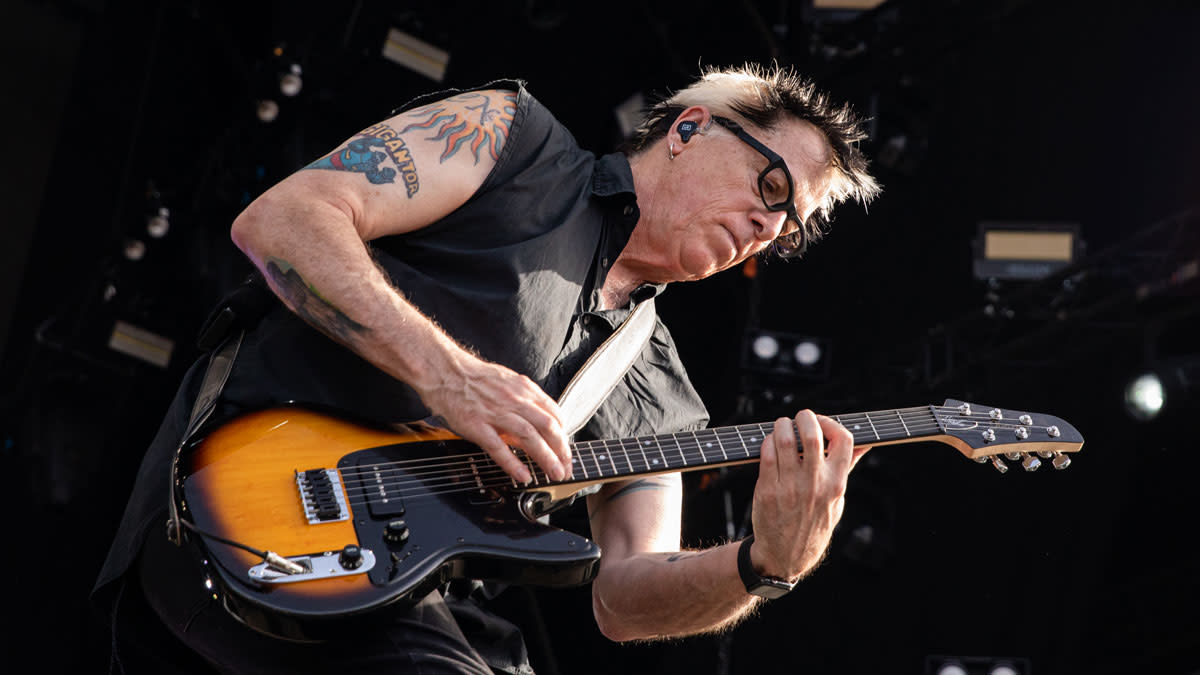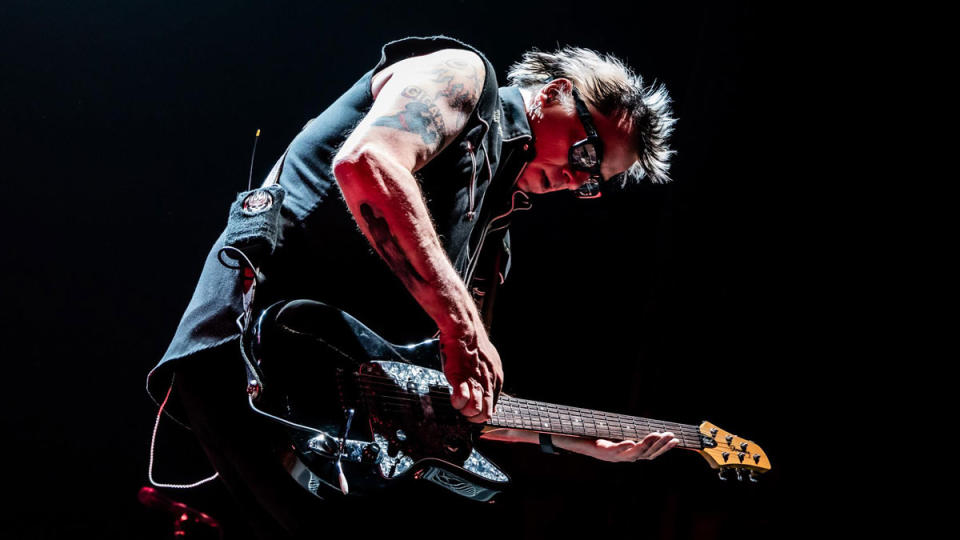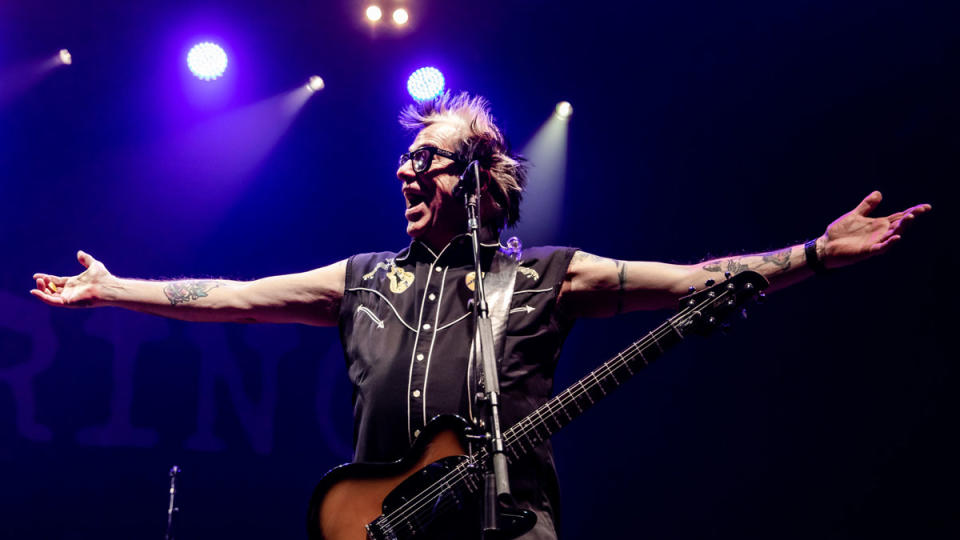The Offspring's Noodles on why he picks Ibanez Talmans over Les Pauls – and that time he played James Hetfield's Explorer

- Oops!Something went wrong.Please try again later.
- Oops!Something went wrong.Please try again later.
- Oops!Something went wrong.Please try again later.
As one of the preeminent punk-rock bands of the last 35 years, SoCal staples The Offspring spearheaded the late-'90s pop-punk movement through big choruses, catchy solos, and chugging riffs.
Many bands of their ilk could be said to follow something of a stock template, but not the Offspring. Sure, they were as hooky as their contemporaries. But heaping doses of heavy riffage made The Offspring outliers as they unleashed iconic records such as Smash (1994), Ixnay on the Hombre (1997), and Americana (1998).
At the heart of The Offspring's wall-of-guitar sound is the one-two punch of longtime cohorts Dexter Holland and Noodles. It's their combined guitar textures that make them utterly distinct – when you hear The Offspring, there's simply no mistaking them for any other band.
"When we're in the studio, Dexter will lay down the first rhythm part, and then he'll double it," longtime Offspring lead guitarist Noodles tells Guitar World. "And then I'll come in and play the same thing, along with the lead. So, we're essentially tripling and sometimes quadrupling everything."
"And a lot of times we'll have it so Dexter pans hard to the right and left, and my guitars will sit right in the middle," the veteran punk-rocker says. "But as far as how we write together, it's a matter of coming up with a lick or a riff, and then we just throw stuff at it until we think it's done. It's a lot of woodshedding."
While others sat back and relied on the familiar, an ever-curious Noodles pivoted, finding new ways to experiment with tone, amp configurations, and curio choices with an aim to push the seemingly simple sound of The Offspring to places unknown.
"I played Strats and Teles early on, but there was always something missing," Noodles admits. "I was always searching for a good clean sound that was still distorted. That's when I started using humbucking pickups, but I still couldn't afford a good Les Paul, so I'd use cheaper stuff with humbuckers in them."
"I didn't get my first Les Paul until Smash came out in '94," he continues. "And that's when I really started to dial in how I wanted to have my sound be. But after playing Les Pauls for a bit, I found that it was so damn heavy and still didn't feel right. Around that time, I discovered Ibanez Talmans, which changed the game for me."
Still, even after all these years, Noodles' songwriting approach and outlook are unchanged. But considering his philosophy had a hand in creating iconic punk-rock staples such as Self Esteem, Come Out and Play, and The Kids Aren't Alright, why change it?
"I keep it simple: a riff has just got to sound good," Noodles tells us. "It's got to be memorable, and that can match the power of the kick drum. When Dexter and I hunker down and work on writing riffs, our thing is if the riff can't match the kick pattern, we'll change the riff until it works in conjunction with the kick."
"But I've also found that the best riffs are things you didn't mean to do," he admits. "Because when you're in the studio throwing things at the wall, you'll end up hearing something that was a mistake, and it turns out to be something amazing. So, you have to be open to taking risks; otherwise, you'll never stumble across those mistakes that turn out to be memorable."
Looking back on the creation of Rise and Fall, Rage and Grace, as well as the sensation that was Americana, Noodles dialed in with Guitar World to talk pickups, amps, pedals, signature guitars, and more.
We're looking at the 15th anniversary of Rise and Fall, Rage and Grace. What was the state of The Offspring entering the sessions for that record?
"We hadn't made a record in around five years, so we wanted to do something cool. And I also remember that it was the first record we'd done with Bob [Rock]. I think we were still with Sony then, and it was also one of the last of our albums that came out with them. So, yeah, it had been a bit, we had a new producer, and we really wanted to make a statement.
"But we just did what we always did – went into the studio and banged it out. I will say that since then, we've worked the same way for the albums that followed. Bob would come into town, we'd work for three or four weeks at a time, and then we'd take some time off and let things settle. And then, we'd go back in and take a crack at some more songs."
What went into choosing Bob?
Bob Rock is not afraid in the studio. He's willing to literally throw anything at the wall just to see what sticks
"It wasn't so much about sound as he could help create something powerful. Of course, he had worked with Metallica, Mötley Crüe, and all those other bands. I think we knew that Bob was able to help get some great guitar sounds to where they'd all sound different but still sound very powerful. So, I think that's what drew us to him.
"And we also found out after Dexter [Holland] flew out to meet Bob that he came up in the Vancouver punk scene. So, that's where his roots were, and we bonded over that as it wasn't something we knew beforehand."
The Offspring have always featured riffs that have bordered on heavy metal. You'd think that working with Bob might go hand in hand with that, too.
"That's an interesting observation. I mean… Bob is not afraid in the studio. He's willing to literally throw anything at the wall just to see what sticks, you know? He knows that taking risks can be funny, as not everything you try is going to work, but we were okay with that.
"The truth is that Dexter came up with a lot of the riffs before we went into the studio with Bob. But those things will often evolve once we get into the studio, and I think having Bob there to work on the guitars with us made all the difference. He's a genius with all that stuff. He encouraged us to try all the different amps, pedals, and guitars we wouldn't usually use."

I know you've personally used everything from Les Pauls to Fenders to your signature Ibanez. What guitars did Bob suggest beyond those?
"Bob brought one of James Hetfield's Explorers. I remember messing around with that for a while, which was different from what we usually used. I don't remember what songs we used it on – it's a heavy metal guitar, so it was certainly a different sound. So, that meant we didn't use it a lot; we added it here and there.
"It sounded just like Hetfield's rhythm stuff and was a bit heavier than what we were used to playing. I think I might have done a solo or two with it, but I can't remember what tracks. We didn't use it extensively, but it is fun and heavy. We had to be mindful of using it because an Explorer with EMG pickups is not very Offspring-sounding."
Seems a far cry from your usual gear. What were the main guitars used, then?
"We've got this one guitar we call 'Number One'. It's a '64 Gibson SG Jr., with one P-90 in it. We used that more than any other guitar when we were recording. It's not like we don't experiment, but it seems to be the guitar we keep returning to. I'm sure I used some Ibanez stuff, too. I also recall a lot of my guitars had soapbar P-90s on them around that time, as I'd just switched over to them."
What led you to stray from your trusty DiMarzio Tone Zone pickups to P-90s?
"There's just a certain growl that you get from the P-90s. The Tone Zone has growl, but I love the nasty sound of P-90s. I was looking for a sound that was as hot as what Dexter was getting, and I thought I could get there with the P-90s. I still wasn't as hot, but if I turned up the gain, kept it at the higher end, and mixed it with where he was – which was even higher up the chain – the blend of our sounds was awesome. I also love how even though it's hotter than most single-coil pickups, there's still a ton of definition to where you can hear the roundness of each string."
One of the more biggest guitar records of the '90s is Americana. Did you go in searching for big guitar sounds?
"Yeah, we did. So, with that record, we were working with Dave Jerden, one of the first producers we worked with, who was all in on guitar sounds. He was very well-rounded, but this was, 'If the guitars don't sound good, we've got nothing.' So, during Americana, that became our primary focus. I remember Dave saying, 'We're gonna make people cry when they hear these guitar tones.' When it was done, we were all very proud of it."
How did you achieve those tones?
"We experimented with a lot of gear. We also used a lot of amps that were new to us. But I remember the Mesa/Boogie becoming the one that did a lot of the heavy lifting. I think the Mark IV was the one that we used most, which has become a trademark thing in terms of our we achieve our tone."

What led you toward Ibanez in creating your signature guitar, the NDM5?
"In the '90s, Ibanez came out with its Talman guitars with fantastic body shapes. I liked their pronounced look and discovered that most were their custom shop models. And then I found that when we played live, I'd often use the bridge pickup, so I'd have the bridge dialed up full blast.
"So, the sound was perfect, and I loved how light the Talmans were. It was light like a Fender but gave me the sound of a Les Paul. So, that's what led me to develop my signature Ibanez. It came from me playing those Talmans with Tone Zone pickups."
You mentioned the Mesa/Boogie Mark IVs earlier. Do you still use them in unison with VHT Pitbulls?
"I've been doing that since maybe the late '90s and love their sound in conjunction. As a band, we love Mesa/Boogie amps because of their heaviness, but they seemed to be lacking on the high-end and can be a bit thin. So, we started adding VHTs because we wanted to add some thickness. So, we doubled up, but I'll admit, having two cabinets on stage every night can be a bit excessive."
Are there any effects pedals you've come to rely on?
"Not a lot. But I do have an old Ibanez Tube Screamer that we use quite a bit. For a long time, that was all we ever used. But lately, we've been experimenting with other pedals on this new record we're working on. I can't talk about the record, but we've been using a SoloDallas Schaffer Replica and that old Tube Screamer.
"Beyond that, we're trying out some chorus, delay, and other things. But nothing too crazy. We still don't use a lot of that stuff. We still prefer to go direct and keep the guitars clean."
What's your favorite Offspring riff?
"I really do love playing our new stuff, but one that I still love to play each night is The Kids Aren't Alright. The intro, the solo and the riffs are awesome. I love that when you hear it, you know what it is and that it still gets people going. But that riff is challenging to play because of the downstrokes. It's not technically challenging; it's just physically demanding. So, as far as something that I'm proud of playing, I'd probably choose that one."
Can you remember recording The Kids Aren't Alright?
"It's part of the blur that was the Americana sessions. But I will say that when we were initially in the studio recording it, The Kids Aren't Alright didn't strike any of us as a hit. But because of how much I loved it, I was so happy to see that it had legs. It just took off, people started playing it, and it became a track that our fans gravitated toward. And like I said, I always loved the song, so it made me happy.
"It's a song with a lot of meaning behind it, but it's also fun. It's got a simple structure and is not technically crazy, but it resonated with audiences, and I'm grateful for that."
The 15th anniversary version of Rise and Fall, Rage and Grace is out now.

